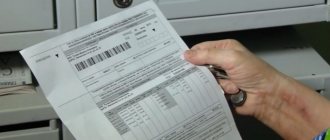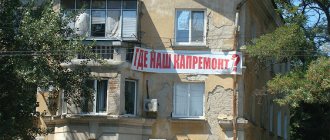Can electricity be turned off for non-payment: legislation
Content
Shutting off electricity for non-payment at the initiative of a resource supplying organization or management company is legal, and a court decision is not required for this. The specifics of the provision, suspension and limitation of public services are regulated by Decree of the Government of the Russian Federation of 05/06/2011 No. 354, Housing Code of the Russian Federation, Decree of the Government of the Russian Federation of 05/04/2012 No. 442.
In Art. 153 of the Housing Code of the Russian Federation states: consumers are obliged to pay for utility services on time, and responsible organizations are required to provide them. If payment is not received for two months or more, a notification is first sent about the need for payment, then electricity consumption is limited, then if the payment is not paid, it is suspended.
Important! In addition to suspending the supply of electricity, a penalty is charged for each day of delay, and the violator may be fined. The lights can also be turned off if payment is not made in full, if a debt is generated in the amount of two monthly payments in accordance with established standards.
Next, we will consider the features of power outages in certain situations.
In winter
The time of year does not affect the right of the resource supplying organization to terminate the provision of services in the event of prolonged non-payment. Even if the debtor has an electric heating boiler and stove running, the electricity supply may be cut off.
Legal advice: if you find yourself in a difficult financial situation, pay at least 500 rubles for electricity every month, then the chance of a shutdown will decrease. An alternative option is to ask the company for an installment plan: in most cases, debtors are met halfway.
If there are minor children
The residence of a small child with the debtor does not affect the right of the supplying organization to stop supplying electricity. Only their parents are responsible for minors, so they should be concerned about their comfort.
There is no point in complaining: if the company followed the established procedure during the disconnection, it is impossible to challenge this. An exception is the presence of a threat to the life and health of a child resulting from a suspension of power supply. In this case, this can be challenged in court, or a pre-trial settlement can be made by asking the management company for installment payments.
Large families
Either one child or three or more children do not give parents the right not to pay utility bills. They are provided with federal and regional subsidies, incl. and for housing and communal services. If there is a debt for electricity, it may be turned off, and the debt will have to be repaid. In addition, in this case, people with many children may be deprived of their rights to benefits: for most payments, the absence of debts on housing and communal services is required.
For disabled people
With disabled people, not everything is clear: according to the rules established by the Government Decree, the presence of a disability group does not cancel the obligation to pay utility bills on time.
But the Supreme Court of the Russian Federation partially disagrees with this opinion, which clearly outlined its position in the Resolution of the Plenum of the Supreme Court of the Russian Federation dated June 27, 2017 No. 22:
“The mere presence of debt for housing and communal services cannot be grounds for suspension or restriction. The actions of the resource-providing company must be proportionate to the violation committed by the owner and not pose a threat to the life and health of others.”
With a high degree of probability, a power outage will negatively affect the health and life of a disabled person, especially if he lives alone or cannot care for himself. In this case, you should file a lawsuit against the company that turned off the electricity and try to defend your rights.
For pensioners
Like people with disabilities, older citizens can also rely on paragraph 40 of the Resolution of the Plenum of the Supreme Court. If they plan to turn off the electricity to a pensioner and have already sent a notice, they should contact the management company or another organization with a request for an installment plan, explaining the reason for non-payment as a difficult financial situation.
In SNT
Previously, SNT could turn off the lights to debtor participants only by court decision, but after the Decree of the Government of the Russian Federation of November 10, 2017 No. 1351 came into force, everything changed. The legislative act states that subscribers connected to SNT electrical networks must pay fees on time, otherwise the debtor may be stopped providing the service.
Now, to turn off electricity to a consumer in SNT, it is enough for the chairman to contact the energy sales company, but he does not have the right to suspend the supply of service at his own request.
It is important that the owner is properly informed before disconnection.
For tenants under a social tenancy agreement
Citizens living in housing under a social tenancy agreement are required to pay for all services on time. If there is debt, the lights can be turned off, and debtors can be evicted without the right to re-enter into an agreement.
Is it legal to cut off power?
The consequences of ignoring the need to pay for utilities will be different for the owner and the tenant. Initially, a penalty may be imposed on both. Its size is established by law and is 1/300 of the refinancing rate of the Central Bank of the Russian Federation for each day of delay.
Penalties are used for up to six months. After this period, the consequences become more severe. The service provider goes to court. As a result of the consideration of the case, the social tenancy agreement will be terminated, and the tenant will be offered other housing of a smaller area.
Eviction of the owner is not possible. However, the court may force the debt to be paid or order the termination of the provision of services.
It should be understood that the service provider is not obliged to be in the position of debtors. Companies act in their own interests and have the right to turn off power if no other means of influence produce results. Such a measure is provided for by law.
Relations between resource supply organizations and the homeowner are regulated not only by the Housing Code of the Russian Federation, but also by the agreement concluded between the parties. In accordance with the service agreement, the consumer is obliged to pay for utilities in full.
However, power outages are not always carried out legally. This will be unlawful if:
Dear readers! We cover standard methods for solving legal problems, but your case may be unique. We will help you find a solution to your problem for free
— simply call our legal consultant at:
+7 (495) 128-73-40 (Moscow)
+7 (812) 603-71-55 (Saint Petersburg)
8 (800) 302-33-75 (free call within Russia)
It's fast and free ! You can also quickly get an answer through the consultant form on the website.
- the procedure for notifying the debtor is violated;
- the debt has been paid, but the supply of the resource has not been resumed;
- the rights of other residents of the apartment building are violated;
- shutting off the supply of the resource led to damage to general communications and the house became uninhabitable.
There should not be a situation where restriction or suspension of the supply of resources leads to a violation of the rights and legitimate interests of other residents. If an HOA turns off everyone’s electricity because of one debtor, this is not legal. If such a situation arises, the owners have the right to go to court.
Other grounds for power outages
In addition to non-payment, electricity supply may be stopped for other reasons:
- Order of Rospotrebnadzor in case of non-compliance of meters with established requirements. Disconnection is carried out only for the period of installation work;
- Formalization of an agreement between a consumer or a company: for example, the owner may apply to suspend the provision of services while leaving to save money;
- Emergency or planned work.
When carrying out scheduled work, consumers must be notified in advance by posting a notice on a board near the entrance. You can also obtain information about planned shutdowns on the official website of the energy sales company by looking at a specially compiled schedule.
Disconnection procedure
Of course, the company providing this type of service cannot turn off its supply without warning. They are obliged to notify the owner of the apartment in writing; moreover, the notice must contain not only information about the disconnection, but also the amount of debt, the time frame within which this will be done and during which the supply can be resumed.
So, the notification procedure is as follows:
- A letter is sent to the defaulter’s address with information that the provision of this type of service will be suspended within 30 days. Receipt of the letter is confirmed by a receipt or a mark indicating the direction of the letter if it is delivered via mail.
- If the apartment owner does not repay the debt within the specified period, the company has the right to suspend or completely stop providing the service. Important - before disconnection, the defaulter is again sent a warning in writing, which indicates that this action will take place within three days; a receipt from the recipient or a mark of receipt is also required.
- The supply of goods can be resumed two days (inclusive) after full repayment of the debt or upon concluding an agreement with the supplier company on the debt repayment procedure.
This can happen in case of complete or partial non-payment of housing and communal services. Partial non-payment is the failure to pay for one of the services in the amount of three monthly fees, regardless of whether the consumer uses meters for this type of service or not.
The provider company also has the right to request a fee for connection and other services provided irregularly.
Is it possible to have a power outage without warning?
It is impossible to turn off the lights for debt without warning - this violates legal norms.
However, there are several situations when the supply of electricity may be temporarily suspended without prior notice:
- Accident in the centralized network;
- Natural disasters or emergencies that require interruption of electricity supply to deal with the disaster or prevent other problems;
- Unauthorized connection to neighbors or intra-house systems;
- The use by consumers of household appliances with a power exceeding the maximum permissible loads;
- An order from a regulatory authority regarding the need to limit or suspend the supply of electricity.
The latter is possible if the condition of the electric grid company’s equipment is unsatisfactory, if its further use threatens the safety, life and health of people.
Actions in case of power outages for non-payment of utilities in 2020
If the lights are turned off for non-payment, then this should not be regarded as punitive measures, but as legal coercion to pay off bills. Of course, it will be legal if the rules governed by Russian law are observed. Let us note that if the regulatory authorities had not done this, the economy as a whole in the country would have suffered great losses. But despite this, power cuts must be carried out within the law. Thanks to this, even malicious draft dodgers have the right to count on the protection and support of the state.
Who has the right to turn off electricity for non-payment?
Suspension of electricity supply is possible at the initiative of several organizations:
- Electricity company, if each service is paid separately. This is relevant for residents of private houses, because... they are not serviced by the management company or HOA, but pay directly to the supplier;
- HOA, if the house is managed by a partnership;
- Management Company;
- Rostekhnadzor, if the meter is faulty or illegal manipulations by the owner are detected, aimed at reducing the cost of services.
All institutions must use established rules when disconnecting.
How does a power outage occur?
The power outage procedure consists of several stages:
- The debtor receives a warning.
- If payment is not made within the established time frame, the owner will be notified again.
- If payment is not received within several days, the electricity is turned off and a corresponding report is drawn up.
Let's look at each stage in detail.
Step 1: Send a warning to the debtor
At least 20 days before the planned shutdown, the resource-providing organization sends a notice of its intentions to the debtor. The document is sent personally by registered mail with acknowledgment of receipt. The payment deadline begins from the day the citizen receives the document.
The notice contains information about:
- FULL NAME. debtor;
- The address where the service is provided;
- The amount of debt;
- Payment terms;
- Planned shutdown date;
- Name and address of the supplier.
The owner is required to pay a fee within 20 days. The company has the right to limit the provision of electricity before suspension.
Sample notice of power outage:
Step 2: Re-warning
If there are no measures taken by the debtor, the company sends the notification again, already 3 days before the disconnection.
Step 3: suspension of the service
At the time of a power outage, at the initiative of a resource-providing or other organization, employees draw up a report. The personal presence of the debtor is not necessary - they can stop the supply of electricity without his participation.
Sample act
There is no unified form of the act; usually it contains the following data:
- Date, place of registration;
- FULL NAME. representatives of the electric grid company in whose presence the document was drawn up;
- Date and time of termination of the service;
- Consumer address;
- Meter readings at the time of shutdown;
- Reasons, amount of debt;
- Counter number;
- Disconnection method.
The act is drawn up in three copies, one is handed to the consumer or sent by mail.
How is debt collection done?
The partnership is obliged to notify the debtor in writing of possible sanctions against him 30 days before the disconnection. The notice is sent to the tenant by registered mail, or given in person against a receipt.
If, after 30 days from the date of receipt of the warning, the debt remains unpaid, the representative of the association of residents of the apartment building again contacts the debtor in writing - this time with a notice of disconnection of the service (also against receipt, three days before the supply of utilities is stopped).
Then the supply of housing and communal services is limited or suspended (if it is technically possible, it is first limited and then suspended).
Next, the owner either signs an agreement with the HOA on the procedure for repaying the debt , or the partnership goes to court with a claim to collect the debt.
Read about issues of reorganization, liquidation or bankruptcy of HOAs on our website. Also find out what your membership, insurance and other fees should go towards.
How is the electricity supply restored?
Resumption of electricity supply is possible after full payment of the debt. In this case, electricity will begin to be provided within two calendar days after the money is deposited.
To use electricity again, you must pay off the debt and submit a receipt to the company that carried out the termination. You can find out the address of the organization in the act. If it is lost, it is worth looking at the receipt for housing and communal services - all information about suppliers is reflected there.
If there is no money to pay off the debt
Faced with financial difficulties, the debtor, after disconnection, has the right to turn to the supplier for an installment plan. If the parties come to an agreement, the electricity supply will be restored.
Legal advice: provide the organization with documents confirming the difficult situation. These may be medical certificates, checks or receipts indicating expensive treatment, etc. The reasons must be valid.
Can the lights be turned off for non-payment?
- Article 330 “Arbitrariness” of the Criminal Code of the Russian Federation. If a crime is detected in the actions of responsible representatives of housing and communal services, the court makes a decision to restore the supply of electricity, and penalties are imposed on the violator;
- in accordance with Article 15 of the Federal Law “On the Protection of Consumer Rights”, stopping the supply of electricity without a legal court decision for non-payment to apartment buildings is a direct violation of the legal rights of consumers and entails compensation for moral damage to residents. An individual - the payer - can file a petition for compensation for moral damage and seek annulment of the decision made by the Management Company.
- information about the consumer who incurred the debt and the company providing the services;
- reasons and duration of restrictions on the use of electricity;
- what kind of debt was incurred and the terms of its repayment;
- when and at what time the shutdown occurs;
- type of restriction: complete - the supply of electricity stops completely, partial - reduction in the supply;
- meter number and current readings;
- what was done to prevent a power outage;
- circumstances that made shutdown impossible (one of these is the risk of an emergency).
Illegal interruption of electricity supply without warning: where to go?
If the supplier violated the rules for suspending services and did not notify the debtor of the planned shutdown, this is illegal.
The owner or tenant of housing in such a situation has the right to complain to one of several organizations:
- Rospotrebnadzor;
- Prosecutor's Office;
- Court;
- City or district administration.
Important! Disconnection is also considered illegal for other reasons: lack of debt for housing and communal services, suspension of services for more than 24 hours during emergency restoration work, which employees were unable to complete in a timely manner.
How to file a complaint about an illegal power outage to the prosecutor's office?
You can contact the prosecutor’s office in person or remotely using the electronic service for citizens’ appeals, if such a function is available on the official website of this body.
The following documents must be attached to the complaint:
- A copy of the disconnection act;
- A copy of your passport;
- Notifications, if they have been sent previously.
Upon receipt of the complaint, the prosecutor’s office initiates an investigation, during which they will establish all the circumstances of the incident and the legality of the supplier’s actions. If they are unlawful, he will be held accountable.
Sample complaint
The form of the complaint is not established by law, but for an objective consideration it is necessary to provide complete information:
- Name and address of the prosecutor's office;
- Name, address of the supplier company;
- Full name, address of the applicant;
- Disconnection date and grounds specified in the act.
It is necessary to indicate a request to understand what happened and take action against the person responsible.
Sample complaint about illegal power outages:
Do they have the right to limit the debtor's electricity?
A homeowners' association has the right to make decisions to limit the supply of electricity to citizens if the HOA has the status of a utility provider.
The obligations and rights of such performers are spelled out in the text of PP No. 354 “On the provision of utility services to owners and users of premises in apartment buildings and residential buildings.” The conclusion of an agreement on the provision of public services (including electricity supply) gives the HOA the status of executor.
The above resolution provides for the right of the contractor to limit or suspend the provision of electricity to the consumer if the latter has incomplete payment for the service.
The concept of incomplete payment means that the consumer has a debt that exceeds the amount of 3 payments per month. In this case, the monthly payment is calculated based on current electricity consumption standards.
According to the law, if a consumer incurs a debt that requires measures to be taken in the form of disconnecting or limiting the supply of electricity, the HOA is obliged to act according to the following scheme:
- Notify the consumer about the possibility of disconnection in case of failure to repay the debt no later than 30 days. It is envisaged that during this period the debtor will come to his senses and pay for the service.
The notice must be drawn up in writing according to the established format and delivered to the consumer against signature or, alternatively, by registered mail. According to the law, a piece of paper with a warning inserted into the door is not a notification.
- Repeated notification. If, after 30 days, the required payments are not received, the HOA sends the debtor another “black mark” in the form of a second written notice, which notifies that restrictions on the supply of electricity have been introduced. This notice must be delivered to the debtor against signature 3 days before the blackout.
Attention! If the limitation of the HOA's electricity supply is not carried out according to the procedure described above (without giving the debtor the relevant notices or the shutdown is carried out before the expiration of 30 days from the date of receipt of the first warning), then such actions are considered illegal!
This mechanism of action of the HOA provides for a limitation, and not a complete cessation of the supply of electricity to the debtor. The limitation provides for a reduction in the amount of electricity supplied during the day, if this is permissible by the technical parameters of the network.
If, due to network parameters, it is impossible to provide a reduced supply of electricity to the subscriber, the HOA does not have the right to completely cut off power to the debtor’s housing. The basis for completely disconnecting a subscriber from power supply networks can only be a court decision. Now you know for sure whether the chairman of the HOA can turn off the debtor’s electricity or not.
Responsibility for illegal power outages
If the company’s actions are qualified as arbitrariness, it will be held accountable under Art. 19.1 of the Code of Administrative Offenses of the Russian Federation and will apply sanctions:
- Fine for citizens – up to 300 rubles;
- Fine for officials – up to 500 rubles.
If electricity is turned off too often and without reason, based on consumer complaints, the company will be charged under Art. 7.23 of the Code of Administrative Offenses of the Russian Federation for violation of standards for providing the population with public utilities.
Criminal liability occurs in exceptional cases. According to Art. 330 of the Criminal Code of the Russian Federation, for arbitrariness that caused significant damage, they may be required to pay a fine of up to 80,000 rubles, be subject to compulsory or correctional labor, or be arrested for a period of up to six months.
If illegal actions caused major damage, serious harm or other serious consequences for a citizen or population, the provisions of Art. 215.1 of the Criminal Code of the Russian Federation. The responsible person may be fined up to 200,000 rubles, have his freedom restricted for up to 3 years, be subject to forced labor for 2 years, or be imprisoned for a similar period.
Arbitrage practice
Citizens often turn to the courts to declare the actions of electric grid companies illegal and to recover moral damages and costs.
The courts usually side with the plaintiffs, and this is confirmed by several decisions:
- Decision No. 2-2208/2019 2-2208/2019~M-809/2019 M-809/2019 dated June 21, 2020 in case No. 2-2208/2019;
- Decision No. 2-108/2019 2-108/2019~M-8/2019 M-8/2019 dated June 28, 2019 in case No. 2-108/2019;
- Decision No. 2-1768/2019 2-1768/2019~M-993/2019 M-993/2019 dated June 27, 2020 in case No. 2-1768/2019.
If the claim is satisfied, the defendant company undertakes to restore power supply to the plaintiff, as well as reimburse legal expenses, if such requirements are specified in the claim.










